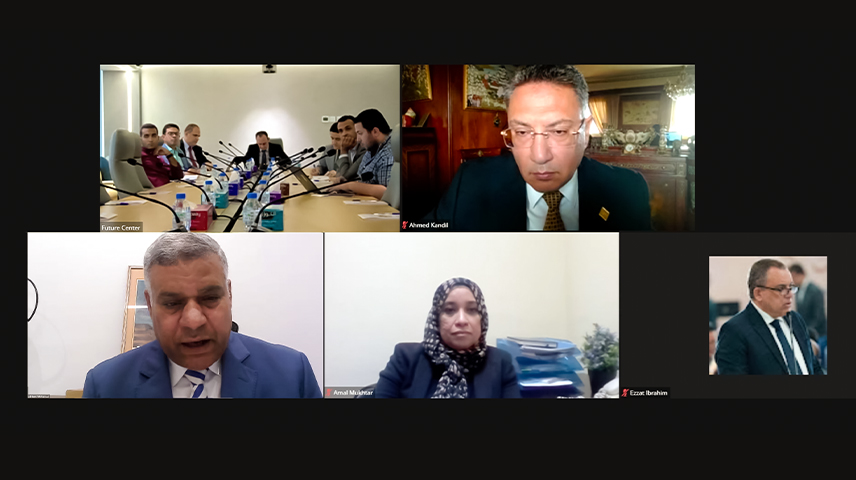Climate security dominated discussions and events of the COP28 agenda in the United Arab Emirates. In this regard, Future for Advanced Rеsеarch and Studiеs (FARAS) held a workshop on December 6, 2023, titled "Pressing Transformations...Climate, Security, and Defense Issues."
The workshop brought together defense and security еxpеrts including Major General Mohamed Abdel Maqsoud, Advisor at the Information and Decision Support Center; Dr. Ezzat Ibrahim, editor-in-chief of Al-Ahram Weekly; Dr. Ahmed Qandil, Director of the Energy Program and an expert in international relations at the Al-Ahram Center for Political and Strategic Studies; Professor Amal Mukhtar, an expert in extremism and violence and editor-in-chief of the Global Scene on Extremism and Terrorism magazine at Al-Ahram Center for Political and Strategic Studies; Ahmed Aliba, head of the Security Trends Unit at FARAS.
The discussion touched on several major trends and subjects, as per the following:
1. The Relations between Climate Change and National Security
The global consequences of rapid climatic changes are intertwined with countries' national security. This motivates countries to adopt policies that reduce climate risks and their implications. Furthermore, states seek to develop their regional and global partnerships, as collaborative action has become an absolute necessity to face the risks and hazards posed by climatic changes.
2. The Case of the Middle East and Africa
In recent years, the manifestations of climate change and natural disasters have multiplied and become more tangible than ever in the Middle East and North Africa, as well as the African coast, similar to what the Libyan city of Derna witnessed from the repercussions of Hurricane Daniel in September 2023, as the country's state of instability affected the handling of this crisis and dealing with its repercussions. Indicators of displacement and migration, as well as the growing presence of extremist organizations in those regions, reflect the African desertification crisis, problems with grazing, agriculture, and rain, and the reciprocal relationship between the effects of these problems and the phenomenon of terrorism and violent extremism.
3. Defense Policies
There is an increasing tendency toward developing emergency response systems to deal with the consequences of violent climate change. Until recently, there was little recognition of the impact of this phenomenon on armies, and the concept of a military footprint was rejected. This has led to defense institutions not being entitled to disclose their data. However, as the influence of extreme climatic changes on military organization, readiness, and operating operations became apparent over time, the armies of the great powers became aware of the immense obstacles they faced and were forced to shift their posture unwillingly.
The Paris Military Forum 2021 was a pivotal moment, and since then, militaries' perspectives on climate change have shifted, leaving their impression on military strategy and finances, particularly in the realm of defense innovation. Some forces, such as NATO's military, have established a department devoted to the necessary adaption. However, there has been some debate about the politicization of climate change issues, including a security and military component. This is given that international polarization is the major feature of ties between the US and NATO on the one hand and China and Russia on the other. Perhaps the most visible practical proof of this trait is the climate changes in the Arctic Circle, which serves as a geopolitical meeting point for these parties.
4. Addressing the Financial Gap
Participants at the COP28 summit indicated that the launch of the Climate Loss and Damage Fund to compensate the countries most affected by climate change on the first day of the summit was a good start that calls for optimism about providing the necessary financing to deal with climate issues, given that this is part of the comprehensive approach to climate change. The UAE's USD 100 million commitment to the Fund incentivized other countries to contribute to it. This is intended to be a step forward in tackling risks and threats in light of the massive financial gap and the continued acceleration of climate change.



